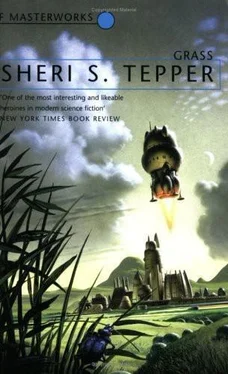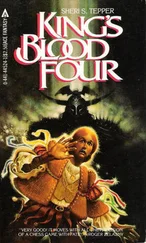“Oh, it’s everything. Accidents and allergies and in Portside there are always a few killings. Everyone accounted for, though; no disappearances except for those who’ve gone into the grass or the swamp forest.”
“Ah?” asked Rigo.
“Of course that’s always gone on,” said the man, suddenly doubtful. “For as long as I can remember. People going into the swamp forest and not coming out. People getting lost in the grass.”
“Who?” asked Marjorie. “Who, lately?”
“The last one was some big braggart of a fellow from off-planet.” Asmir referred to his notes, written neatly in a tiny, meticulous hand on various scraps of paper, which he arranged and rearranged as they spoke. “Bontigor. Hundry Bontigor. Loud mouth, people said. Swagger. Full of dares and boasts. Someone dared him to go into the swamp forest, and he went. Didn’t come out. He was only here on a weeklong permit, between ships. Nobody missed him much.”
“Has there been a case in which someone disappeared and it was… merely assumed that the person had gone into the forest?” Marjorie ran pinching fingers up the bridge of her nose and across her forehead, trying to evict the headache that had settled there.
Asmir shuffled his notes once again. “Last ones, before Bontigor, were kids. Nobody saw them go in there, if that’s what you mean. Time before that… well. Time before that was an old woman. Kind of gone, if you take my meaning. People couldn’t find her, so they thought—”
“Ah,” said Marjorie.
“Then there was that couple over at Maukerden village. And the carpenter from Smaerlok. And here’s somebody from Laupmon—”
“Lost in the grasses?”
He nodded. “But that’s always happened.”
“How many?” asked Rigo. “How many do you have listed, within the past collect? No, that would have been winter. Say last fall. How many assumed lost in the swamp forest or the grass last fall?”
“Fifly,” estimated Asmir. “Fifty or so.”
“Not many.” murmured Marjorie. “It could be what they think it is. Or it could be… illness.”
Rigo sighed. “Go on, Asmir. Keep gathering. Get everything you can about disappearances — who disappeared, how old they were. whether they seemed healthy before they went, things like that. Is Sebastian helping you?”
“Yes, sir. I gave you his information along with mine.”
“Keep at it, then, both of you.”
“If you could tell me—”
“I told you what I could when I hired you, Asmir.”
“I thought… I thought perhaps you didn’t trust me then.”
“I trusted you then and now.” Rigo smiled, one of his rare and charming smiles. “I told you I’m taking a special census for Sanctity. It has to do with human mortality. I’ve told you quite lot about Sanctity and how it tries to keep track of the human race, so you can understand why Sanctity would be concerned with what people die of. But the aristos won’t allow Sanctity to have a mission on Grass, so Marjorie and I agreed to find out what we can. However, we’re not going to offend the bons, so we’ll do it quietly. All we want to know is if there is any unexplained mortality on Grass.”
“If anybody mortals in the swamp forest, you’ll never explain it,” Asmir said firmly. “If they mortal in the grasses at night, it’s probably foxen. You’ve seen foxen?”
Marjorie nodded. She had seen foxen. Not close enough to describe, but quite as close as she cared to come.
“You’ve seen more’n me, then,” he said, lapsing into a less portentous style. “But I’ve seen pictures.”
“I take it you don’t go out into the grass?”
“Oh, sir, no! What kind of flick bird do you take me for? Oh, daytimes, yes, a little way, for a picnic or a romantic walk, say. Or to get away by yourself for a bit. But that’s what village walls are for, and estancia walls too. To keep them out.”
“Them?” queried Marjorie, gently.
He told the roll of them, words that clanged like the toll of a knell as his awestruck voice invoked incipient funerals out of each one: “Peepers. The thing that cries out in the deep night — The great grazers. Hounds. Hippae. Foxen. All them.”
“And no one really goes far into the prairie?”
“People say the Green Brothers do. Or some of them. If so, they’re the only ones that dare. And how they dare. I wouldn’t know.”
“The Green Brothers,” mused Rigo. “Oh, yes. Sanctity’s penitential monks. The ones digging up the Arbai city. Sender O’Neil mentioned the Green Brothers. How would we go about reaching them?”
Rillibee Chime, robed in unfamiliar green, his tear-streaked face unpowdered, crouched behind Brother Mainoa in a little aircar as it scuttled bouncily northward. “Can you tell me where we’re going?” he asked, wondering whether he cared — He felt hag-ridden and nauseated, unsure even of his own identity, he who had always fought so hard to keep it.
“To the Arbai city I’ve been digging,” said Brother Mainoa comfortably. “Some ways north of here. We’ll stop there for a day or two, let you get to feeling better, then I’ll take you on up to the Friary. I’m supposed to bring you directly there, but I’ll tell ’em you were sick. Soon as you get to the Friary, either Jhamlees Zoe or the climbers’ll be after you, and there’s nothing I can do about that. So, best you be feeling well when we get there.”
“Climbers?” Rillibee asked, wondering what on all this great, flat prairie there was to climb.
“You’ll learn about them soon enough. Not much I could tell you. They started their nonsense long after I was young enough to take part in it. You’ll feel better sooner if you lie down, you know. Lie down for a little bit and when we’re out of this wind, I’ll let the tell-me drive while I get you some broth.”
Rillibee let his crouch sag into a slump, the slump into a prostrate misery full of gulpings and more silent tears. Ever since they had wakened him from coldsleep he’d had these nightmares, these horrid feelings, this insatiable hunger.
“What did you do to get sent to us?” Brother Mainoa asked. “Tear one of the angels off Sanctity and sell it to the Pope?”
Rillibee sniveled, finding this funny in a sodden way. “No,” he managed. “Nothing quite that bad.”
“What, then?”
“I asked questions out loud.” He reflected. “Well, I screamed them, really. In refectory.”
“What kinds of questions?”
“What good it would do to have us all listed in the machines when we were all dead. How reading our names in empty rooms gave us immortality. Whether the plague wasn’t going to kill us all. That kind of questions.” He sobbed again, remembering the horror and confusion and his own inability to control what he was doing.
Ah.” Brother Mainoa struggled with the controls, grunting as he punched buttons that did not seem to want to stay punched. “Fouled up houndy uselessness,” he muttered. “Damned shitty mechanics.” At length the controls responded to being whacked with the palm of his hand and the car settled upon a level course. “Broth,” he said calmly and comfortingly, smiling down at Rillibee. “So you asked about plague, did you?”
Rillibee didn’t reply.
After a time the older man said, “We’ll have to come up with a name for you.”
“I’ve got a name.” Even in the depths of his present depression he bridled at the thought that he could not keep his own name.
“Not a Friary name, you don’t. Friary names have to be made up out of certain qualities.” Brother Mainoa whacked the cooker with the flat of his hand, scowling at it. “Twelve consonant sounds and five vowels, each with its own holy attribute.”
“That’s nonsense,” mumbled Rillibee, licking tears from the corner of his mouth. “You know that’s nonsense. That’s the kind of thing — That’s what I was asking in refectory. Why so much nonsense?”
Читать дальше












